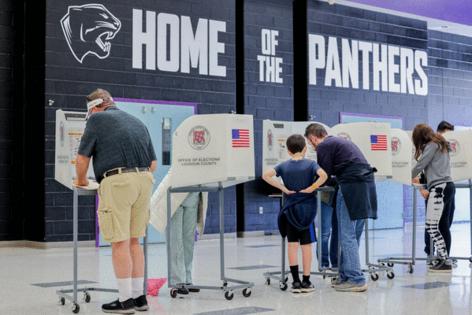George Skelton: Electoral College system is a bad way to pick a president
Published in Op Eds
Before this year's presidential election slips into gloomy history, we should pause to slam our moldy, undemocratic vote-counting system called the Electoral College.
If Donald Trump had to win, it's good that he prevailed in both the archaic Electoral College and the national popular vote.
The popular vote should always settle who is elected president. Name one other office in America that's not decided by who gets the most votes — from state governor down to first-grade class president.
But the national popular vote doesn't count for squat in a U.S. presidential election. All that counts is our ancient Electoral College system, rooted in the Founders' appeasement of Southern slave states.
It's beneficial, however, that Trump apparently also won the popular vote. Because now we should be able to hold a rational conversation about the evils of the Electoral College without being tagged as poor-loser partisans whining that the Democrat lost despite having been favored by most American voters.
There are two bad things about our Electoral College system:
•It's possible for the major party candidate who's least favored by the nation's voters to be elected president, as we've seen.
•It focuses the candidates' attention on a few battleground states, and the rest of us are ignored.
Big states, little states, it doesn't matter. If they're blue or red, their voters are relegated to the cheap seats as distant spectators to the main event being fought in a few purple swing states. The blues and reds are taken for granted and snubbed.
The candidates don't hear from California voters about the acute water troubles in our state. But they're lobbied about manufacturing declines in Michigan and Pennsylvania. It's an old cliche and true: Squeaky wheels get the government grease.
It's not the Electoral College, per se, that's the culprit. It's how the electoral votes are awarded by the states. They're parceled out on a winner-take-all basis. If a candidate carries a state by one vote or 1 million, it's irrelevant. All the state's electoral votes go to the popular vote winner.
Two small states — Nebraska and Maine — are exceptions. They partially award electoral votes based on who wins in congressional districts. That makes more sense than strict winner-take-all.
In California, at least 5.9 million people voted for Republican Trump. They might as well have used their ballots for fireplace kindling. All 54 of the state's electoral votes will be awarded to Democrat Kamala Harris, who received roughly 9.1 million votes. (When the final count is in, the vote totals will increase slightly.)
Same thing in Texas, only vice versa. There, 4.8 million people voted for Harris. But all 40 electoral votes are going to Trump, who was supported by 6.4 million people.
Republican voters were effectively disenfranchised in California, as Democrats were in Texas.
Polling has shown that the overwhelming majority of Americans — including Californians — want to junk the Electoral College system and elect the president by popular vote.
A September survey by the Pew Research Center found that 63% of Americans prefer that the presidency be decided by the national popular vote.
Conservative Republicans, however, like the status quo — no doubt because two GOP candidates in recent years have won the presidency while losing the popular vote: Trump in 2016 and George W. Bush in 2000.
But junking the Electoral College entirely won't happen any time soon because it's politically impossible. It would require a constitutional amendment. And that would need a two-thirds vote by each house of Congress — both about to be controlled by the GOP — plus ratification by three-fourths of state legislatures.
Red state politicians won't sign off because Republican candidates benefit from the current nonsense. Neither would purple states because they enjoy all the attention and campaign bucks as "battlegrounds."
But there's a way to reform the system and still retain the Electoral College. Just change how the electoral votes are awarded. Parcel them out in proportion to each candidate's popular vote in the state.
In California, Harris got roughly 59% of the vote and Trump, 38%. Minority candidates picked up 3%, but I'd shift their tiny amount to the major contenders for electoral vote purposes. Harris would wind up with 33 and Trump with 21.
In Texas, Trump would win 23 electoral votes and Harris, 17.
A proportional allocation system "would make sure that every vote counts and lessen the likelihood that the candidate who loses the popular vote will become president," UC Berkeley law school dean Erwin Chemerinsky wrote in a recent Sacramento Bee op-ed.
Besides Trump and Bush, three presidents were elected in the 1880s while losing the popular vote: John Quincy Adams, Rutherford B. Hayes and Benjamin Harrison.
"The Electoral College was based on the framers' distrust of majority rule and was a tremendous boost to slave states' political power," Chemerinsky told me.
The South fretted about the North's larger population and the Yankees' political clout. So the founders compromised. Slaves wouldn't be allowed to vote, but they could count as three-fifths of a person for the purpose of apportioning members of the House of Representatives based on population.
That strengthened the South in the Electoral College because a state's number of electors is based mostly on the size of its House delegation. But every state also gets an elector for each senator. And each state is entitled to two, regardless of its size — an allotment designed to dilute the power of big states.
I didn't do all the math, but it's a safe assumption that Trump still would have won the Electoral College vote under a proportional allocation system.
Chemerinsky, a constitutional scholar, believes the reform could be passed by Congress without amending the Constitution.
But first, Americans would need to insist that they elect the president, not the states.
©2024 Los Angeles Times. Visit at latimes.com. Distributed by Tribune Content Agency, LLC.




























































Comments